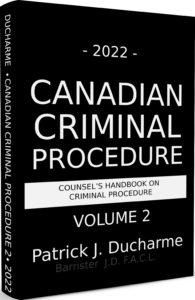 |
| Patrick Ducharme |
Types of Offences
Types of Proceedings
There are three types of offences: summary conviction, indictable, and dual or hybrid offences.
Indictable Offences
Indictable offences are more serious. They permit the imposition of greater sentences. Section 743 of the Code provides a maximum of five years imprisonment if the penalty for an indictable offence is not otherwise specified. Any sentence of two years or more will be served in a Federal penitentiary.1 Sentences of one day less than two years and lower are served in Provincial prisons. There is seldom a statutory limitation period for indictable offences. Indictable offences are divided into three categories:
1. indictable offences that must be tried without a jury before a provincial court Judge pursuant to section 553;
2. indictable offences that must be tried before a Superior court Judge with a jury pursuant to section 4692; and,
3. indictable offences where the accused is given an opportunity to elect his or her mode of trial pursuant to the possibilities in section 536 of the Code.
Summary Conviction Offences
Summary conviction offences are the least serious offences in the Code. Section 787 provides for a standard maximum penalty of six months imprisonment and/or a fine up to $5,000 for these offences. The maximum period of imprisonment for non-payment of a fine is six months unless otherwise provided in the statute. The only common-law exception to these provisions is for the offence of criminal contempt. Persons convicted of criminal contempt may face a jail sentence greater than six months because criminal contempt is a common-law offence preserved by section 9 of the Code. This section preserves the power of a Judge to penalize greater than six months for criminal contempt.
It is open to a court to pass a sentence that does not provide for imprisonment in default of payment of a fine. In these circumstances the court may leave recovery to the civil process.3 Or, the Judge may impose, in default of payment of the fine or compliance with the order, imprisonment for a term not exceeding six months.4
Certain specified hybrid offences have increased penalties to a maximum of eighteen months imprisonment. For example, assault causing bodily harm, or, assault with a weapon or sexual assault are offences that provide the possibility of eighteen months in prison if the prosecutor proceeds summarily. In the case of sexual assault, if the complainant is under sixteen years of age, the penalty provides for a minimum mandatory imprisonment of ninety days.
Crown Option Offences (Hybrid Offences)
Although a summary conviction time limitation has expired, the prosecutor may still be able to proceed by indictment where the offence is one that provides the prosecutor with an option to proceed by indictment.5 We refer to these charges as “Crown option offences” or “hybrid offences” or “dual option offences”. The charging section itself specifies whether the offence is a straight indictable offence, a hybrid offence or a summary conviction offence. When a section prescribes a specific time limitation, the specific, not the general time limitation of section 786 applies.
Recent case law suggests that a court may convict an accused of a summary conviction offence included within an indictable offence even though proceedings for the indictable offence were commenced at a time when the summary conviction offence would be prohibited by a time limitation. If the accused is charged with an indictable offence, and, with the prosecutor’s consent, pleads guilty to a lesser offence that is a hybrid offence, the accused is presumed to plead guilty to an indictable offence.6 After the prosecutor has elected to proceed by way of summary conviction, and a plea has been taken and evidence given, the prosecutor cannot thereafter elect to proceed by indictment.7 If the prosecutor does not elect on a hybrid offense and the case proceeds in a summary conviction court, the prosecutor is “deemed” to have elected to proceed by summary conviction.8

The above is the an excerpt of Patrick J Ducharme's book, Canadian Criminal Procedure Volume 2, available at Amazon or in bulk through MedicaLegal Publishing along with Criminal Trial Strategies.
Subscribe to Patrick Ducharme's Youtube Channel
